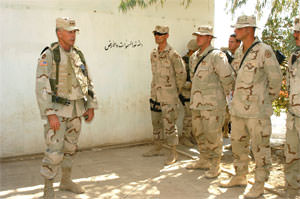‘Surge’ Rhetoric Not Universal
Despite criticisms of the efficacy of the "surge" in Iraq, a US commander in Afghanistan has dared to say that a planned "surge" in Afghanistan would in fact not help U interests in the country The commander did make sure not to completely deweaponize the Bush administration's rhetoric, suggesting instead that a different type of surge is needed.
Despite criticisms of the efficacy of the “surge” in Iraq, a U.S. commander in Afghanistan has dared to say that a planned “surge” in Afghanistan would in fact not help U.S. interests in the country. The commander did make sure not to completely deweaponize the Bush administration’s rhetoric, suggesting instead that a different type of surge is needed.
Your support matters…CNN:
A troop “surge” is credited with stemming violence in Iraq, but could a similar strategy work in Afghanistan? A top U.S. military commander isn’t counting on it.
In 2007, as part of the surge strategy, President Bush sent roughly 30,000 additional troops to Iraq in an attempt to improve security.
That effort coincided with a drop in violence, and, now that the troops in Iraq are returning to pre-surge levels, the Army is identifying combat units that could go Afghanistan to fill the need for 10,000 additional troops, military officials said.
But a different type of surge is needed in Afghanistan, said Gen. David McKiernan, the top NATO commander there.
Independent journalism is under threat and overshadowed by heavily funded mainstream media.
You can help level the playing field. Become a member.
Your tax-deductible contribution keeps us digging beneath the headlines to give you thought-provoking, investigative reporting and analysis that unearths what's really happening- without compromise.
Give today to support our courageous, independent journalists.






You need to be a supporter to comment.
There are currently no responses to this article.
Be the first to respond.